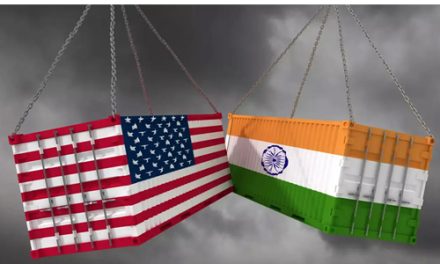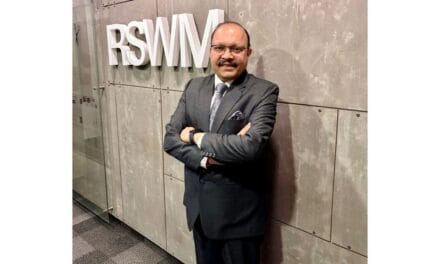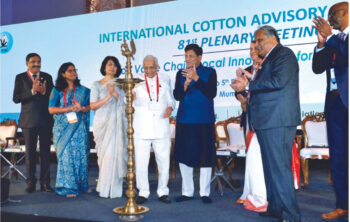 As the second-largest producer of cotton in the world, with the fastest-growing consumer base and a significant portion of agricultural and industrial employment coming from the cotton textile value chain, cotton is of great importance to India. was a very special event for India to discuss various aspects and issues of cotton.
As the second-largest producer of cotton in the world, with the fastest-growing consumer base and a significant portion of agricultural and industrial employment coming from the cotton textile value chain, cotton is of great importance to India. was a very special event for India to discuss various aspects and issues of cotton.
The four-day event, which was held from December 2 to 5, 2023, in the Jio World Convention Centre, Mumbai, with the theme “Cotton Value Chain: Local Innovations for Global Prosperity,” was an important occasion for India to showcase its innovations, sectoral vibrancy, and leadership in the cotton value chain. The plenary meeting was followed by a tour of Ahmedabad.
International Cotton Advisory Committee (ICAC) inaugurated by Piyush Goyal, the Hon’ble Minister of Textiles, Commerce & Industry, and Consumer Affairs, Food & Public Distribution, Government of India, The event had comprehensive deliberations, delving into pivotal subjects such as sustainability, advancements in textile technologies, cotton projects, productivity enhancement in cotton, developments within the cotton value chain, economic trends, policies, demand and supply dynamics, subsidies, climate-smart innovations, price risk management, integrated pest management, and a World Cafe session where institutional collaborations on various interventions for strengthening the cotton value chain was discussed. This international gathering brought together representatives from diverse nations, unified by a common objective to augment value and stimulate development within the cotton sector.
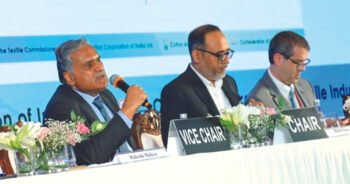
Rakesh Mehra, Chairman, CITI highlighted the advances in textile technologies that are shaping the textile landscape, emphasizing the integration of cutting-edge technologies to enhance efficiency, sustainability, and overall productivity within the industry.
Cotton cultivation plays a major role in sustaining the livelihood of an estimated 6.5 million cotton farmers and several million people engaged in related activities such as cotton processing and trade, thus, making Cotton the backbone of the Indian economy.
India has the highest area of cotton cultivation in the world, with around 13 million hectares under it and accounting for 23% of world production. Contrary to the global trends on fiber use, cotton based T&A products accounts for more than 60% of our T&A market. Cotton feeds into one of the most modernized spinning sectors in the world with the Indian textile sector witnessing investment in the latest technologies in the last one decade or more.
The ICAC programme discussed various dimensions of cotton and its socio-economic impact on the global and Indian textile value ains. But the most important development for the textile industry that we are very happy to showcase at the event was the launch of the Indian brand of cotton, i.e., “Kasturi Cotton Bharat,” which was a much-needed quality and branding initiative. ‘Kasturi Cotton India’ aims to strengthen India’s competitiveness in the global cotton market and create a sustainable ecosystem for all stakeholders involved.
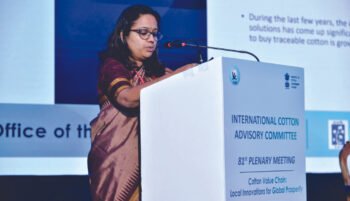
Chandrima Chatterjee, Secretary General of Confederation of Indian Textile Industry (CITI)
The Confederation of Indian textile industry, erstwhile Indian Cotton Mills Federation, as one of the oldest Industry association, has been witness to the evolution of the Indian cotton textile industry for more than six decades. With the fast changing trends and demands of the fashion industry, I think the industry today needs to strengthen not just its quality and cost competitiveness but also positioning as a transparent, sustainable and socially inclusive sector. While our huge cotton farmers community is our strength, the small and fragmented nature of the majority land holdings and farmers limited bandwidth to adopt the latest technologies and innovations, besides growing technology gaps in mechanisation and seed varieties are challenges that the industry and Government need to work upon together to ensure fiber availability for feeding the projected growth of Indian textile industry.
Indian textile industry is looking at a $350 bn industry by 2030, which gives a huge scope for the cotton industry to grow. Emergence of a strong and organised Farmer Producer Organisations (FPOs), a never before synergised efforts by various ministries to address the agronomic, technological and financial challenges of the sector and a bold step towards Branding and Traceability are developments that give confidence to the stakeholders of a promising future.
The industry is also optimistic of the upcoming Free Trade Agreements that India is negotiating with important cotton textile destinations which can have an important bearing on the demand and supply factors of this sector.
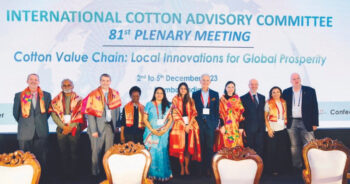 Recognising the need for better engagement of the user and the producer industry, CITI’s Cotton Development and Research Association has been actively engaged in improving agronomic practices and farmers awareness of the new technologies and good practices. Better income and welfare of the farmers through balanced farming techniques that meet India’s need for enhanced productivity without compromising on the soil health or environmental impact is what the CITI CDRA works towards. The technical sessions at ICAC would be a great platform for institutions like this to exchange knowledge on feasible and adoptable new farming practices.
Recognising the need for better engagement of the user and the producer industry, CITI’s Cotton Development and Research Association has been actively engaged in improving agronomic practices and farmers awareness of the new technologies and good practices. Better income and welfare of the farmers through balanced farming techniques that meet India’s need for enhanced productivity without compromising on the soil health or environmental impact is what the CITI CDRA works towards. The technical sessions at ICAC would be a great platform for institutions like this to exchange knowledge on feasible and adoptable new farming practices.
The Confederation of Indian Textile Industry (CITI) extends its sincere gratitude to all contributors, stakeholders and participants for their invaluable presence, cooperation, and efforts throughout the event and also discussion on important aspects of global Cotton including Climate change, organic cotton integrity, labeling, quality assurance, Climate-smart innovations, Genetics, pest management, price risk management, women empowerment, certification, etc.
More details on the various speakers and their presentations can be accessed on the web: https://icac.org/Meetings?EventTypeId=1&MenuId=6



